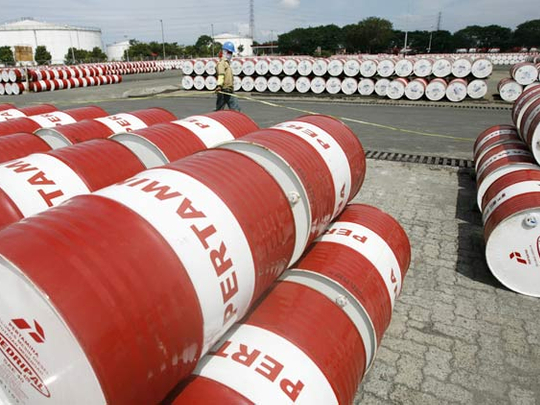
Abu Dhabi: A move last week by the US and other member countries of the Paris-based International Energy Agency (IEA) to release 60 million barrels of crude oil from their strategic petroleum reserves is going to bring international crude oil prices down in the near-term and provide some relief to the beleaguered oil importing nations, say experts.
"It was aimed at easing market fears, to prevent speculation on the oil market and to bring down prices. The prices have eased. Whether they will ease off further, remains to be seen," Kate Dourian, Middle East Editor for Platts, a global energy information provider told Gulf News.
Production cut
"Under IEA rules, the member countries need to maintain 90 days of forward cover. So, the participating countries will have to replenish their stocks," Dourian added.
"I think Opec [Organisation of Petroleum Exporting Countries] is going to cut production once the price of oil drops below $90 [Dh330.30] a barrel," said K. Al Awadi, an Emirati energy expert.
On Thursday it was annouced that the US will sell 30 million barrels from its Strategic Petroleum Reserve, the largest release ever from the nation's emergency energy stockpile. The International Energy Agency said its other members will draw down an equal amount.
The announcement drove down the cost of the benchmark West Texas Intermediate crude oil by nearly 5 per cent, to $91.02 a barrel. IEA Executive Director Nobuo Tanaka announced that the 28 IEA member countries have agreed to release 60 million barrels of oil in the coming month in response to the ongoing disruption of oil supplies from Libya.
Pronounced effect
"This supply disruption has been under way for some time and its effect has become more pronounced as it has continued. The normal seasonal increase in refiner demand expected for this summer will exacerbate the shortfall further. Greater tightness in the oil market threatens to undermine the fragile global economic recovery," said Tanaka in a statement received by Gulf News.
"In deciding to take this collective action, IEA member countries agreed to make 2 million barrels of oil per day available from their emergency stocks over an initial period of 30 days. Leading up to this decision, the IEA has been in close consultation with major producing countries, as well as with key non-IEA importing countries," Tanaka added.
Refinery blaze put out
Abu Dhabi National Oil Co's 85,000 barrel-a-day Umm Al Nar refinery was struck by a fire that emergency crews brought under control within 45 minutes, the official Emirates News Agency said, citing a fire official.
The blaze began at 10:45am in a boiler and spread to fuel tanks, WAM reported. No one was injured in the fire, it said, without providing details.
— Bloomberg












